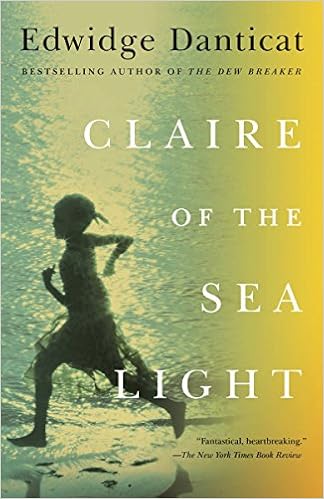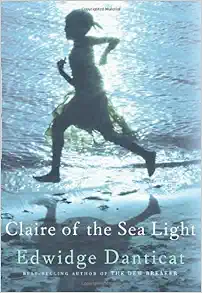
Description
In a 1930s Dominican Republic village, the scream of a woman in labor rings out like the shot heard around Hispaniola. Every detail of the birth scene--the balance of power between the middle-aged Señora and her Haitian maid, the babies' skin color, not to mention which child is to survive--reverberates throughout Edwidge Danticat's Farming of Bones . In fact, rather than a celebration of fecundity, the unexpected double delivery gels into a metaphor for the military-sponsored mass murder of Haitian emigrants. As the Señora's doctor explains: "Many of us start out as twins in the belly and do away with the other." But Danticat's powerful second novel is far from a currently modish victimization saga, and can hold its own with such modern classics as One Hundred Years of Solitude and The Color Purple . Its watchful narrator, the Señora's shy Haitian housemaid, describes herself as "one of those sea stones that sucks its colors inside and loses its translucence once it's taken out into the sun." An astute observer of human character, Amabelle Désir is also a conduit for the author's tart, poetic prose. Her lover, Sebastian, has "arms as wide as one of my bare thighs," while the Señora's complicit officer husband is "still shorter than the average man, even in his military boots." The orphaned Amabelle comes to assume almost messianic proportions, but she is entirely fictional, as is the town of Alegría where the tale begins. The genocide and exodus, however, are factual. Indeed, the atrocities committed by Dominican president Rafael Trujillo's army back in 1937 rival those of Duvalier's Touton Macoutes. History has rendered Trujillo's carnage much less visible than Duvalier's, but no less painful. As Amabelle's father once told her, "Misery won't touch you gentle. It always leaves its thumbprints on you; sometimes it leaves them for others to see, sometimes for nobody but you to know of." Thanks to Danticat's stellar novel, the world will now know. --Jean Lenihan From Publishers Weekly The almost dreamlike pace of Danticat's second novel (Breath, Eyes, Memory, 1994) and the measured narration by the protagonist, Amabelle Desir, at first give no indication that this will be a story of furious violence and nearly unbearable loss. The setting, the Dominican Republic in 1937, when dictator Trujillo was beginning his policy of genocide, is a clue, however, to the events that Amabelle relates. She and her lover, Sebastien Onius, are Haitians who have crossed the border. Amabelle is a servant to a patrician family, while Sebastien endures the brutal conditions of work in the cane fields. The lovers each have poignant memories of parental deaths, and other deaths enter the narrative early, subtly presaging the slaughter that is to come. Haitians in the DR, always regarded as foreigners, are "an orphaned people, a group of vwayaje, wayfarers." When a military-led assault against them does erupt, it is a surprise, however, and as Amabelle barely survives a massacre by soldiers and an equally bloodthirsty civilian population, the narrative acquires the unflinching clarity of a documentary. In addition to illuminating a shameful, little known chapter of history, Danticat gives us fully realized characters who endure their lives with dignity, a sensuously atmospheric setting and a perfectly paced narrative written in prose that is lushly poetic and erotic, specifically detailed (the Haitians were betrayed by their inability to pronounce "parsley") and starkly realistic. While this novel is deeply sad, it is infused with Danticat's fierce need to bear witness, coupled with a knowledge that "life can be a strange gift" even when memory makes endurance a difficult task. 50,000 first printing; first serial to VLS; QPB selection; rights sold in U.K., Germany, Spain, Holland, Denmark and Finland; paperback rights to Penguin; author tour.Sept.)Copyright 1998 Reed Business Information, Inc. From School Library Journal YA-At one time the people of Haiti and the Dominican Republic accepted and nurtured their interdependency. Trujillo's racist regime marked the end of this peaceful coexistence with the deplorable Massacre of 1937. This tragic and horrific ethnic cleansing is remembered by Amabelle, an aging Haitian woman who lived through this period as a young girl. Orphaned when her parents are swept away by a swollen river, she is cared for by the Haitian community across the river in the Dominican Republic. Eventually she falls in love with Sebastien Onius, a worker in the cane fields; their lives are forever entangled as the events of 1937 gather them in. She flees, becoming companion and nursemaid for the wife of Se?or Pico Duarte, a member of Trujillo's inner circle. For the rest of her life, Amabelle searches for Sebastien, never completely able to accept his death. Danticat's lyrical writing propels readers forward. This is an emotionally charged story and a powerful historical account that helps readers understand the radical division that exists between two countries on a single island. Dottie Kraft, formerly at Fairfax County Public Schools, VA Copyright 1998 Reed Business Information, Inc. From Library Journal Haitian-born novelist Danticat, perhaps best known for Krik? Krak! (LJ 3/15/95), uses "calm, lyrical, sensual language" to explore the brutal massacre carried out by Dominican president Trujillo. Copyright 1998 Reed Business Information, Inc. From Booklist Danticat was 12 years old when she left her native Haiti for the U.S., and memories of her homeland have been the impetus for her haunting fiction, including Breath, Eyes, Memory (1994), which was selected for Oprah Winfrey's book club. In her second novel, a work of pure and solemn beauty, Danticat writes about a rarely recounted act of "ethnic cleansing" carried out in 1937 by the Dominican Republic's brutal dictator, Trujillo. Julia Alvarez has written of Trujillo's evil from the Dominican side, and now Danticat offers a mirror perspective through the eyes of her sweet-natured narrator, Amabelle. Taken in by a kind Dominican family after witnessing her parents' deaths by drowning, Amabelle, a maidservant, has come to love her kind employers, and she is just about to marry a cane-cutter, Sebastien, when Trujillo decides to rid his country of Haitians. All is quickly lost in the massacre: her home, friends, and betrothed, her health, beauty, trust, and hope. A magnetic storyteller and quietly passionate witness to the madness of prejudice and genocide, Danticat presents an eloquent and unforgettable prayer of a shattered survivor. Donna Seaman From Kirkus Reviews A strong second novel from the Haitian-born author whose debut, Breath, Eyes, Memory (1994), was recently anointed by Oprah, and whose story collection, Krik ? Krak !, won the National Book Award in 1995. Danticat's subject is the 1937 massacre by Dominican islanders of Haitians living within their borders, at the command of Dominican dictator Trujilloas experienced, and then remembered many years afterward, by the story's narrator, Haitian maidservant Amabelle Desir. In the lyrically written opening section, Amabelle's intimate moments with her lover, sugarcane worker Sebastien Onius (the two of them share memories of their deceased parents), are counterpointed against her submissive relationship with Senora Valencia, the wife of a Dominican army officer whose own loss of a child subtly foreshadows the many disasters to come. The long middle of the story describes the despised and terrified Haitians' extended march back to their own country, during which Amabelle and Sebastien are separated. In the meditative last third (almost devoid, unfortunately, of dramatic tension), set a quarter-century later, Amabelle finally makes her peace with her bereavement, and, after an emotional reunion with Senora Valencia, passively accepts the fate shes been prepared for by her contemporaries and forebears alike. Danticat tells this sorrowful tale in rich, lush prose that veers, often very suddenly, between rigidly controlled understatement and feverish emotionalism. Her word pictures are extraordinarily precise and compelling, as in a representative description of fires set to clear harvested cane fields: ``The smell of burning soil and molasses invaded the air, dry grass and weeds crackling and shooting sparks, vultures circling low, looking for rats and lizards escaping the blaze. Though it loses intensity as it proceeds, here's more than sufficient passion, color, and empathy to confirm Danticat's high standing among our more gifted younger writers. (First printing of 35,000; author tour) -- Copyright ©1998, Kirkus Associates, LP. All rights reserved. ...every chapter cuts deep, and you feel it. -- Time , Christopher John Farley ...giving a voice to those who cannot speak is still her special gift. -- Newsweek , Sarah Van Boven Despite ... complex shading, the novel doesn't consistently achieve the nimble intensity of Danticat's strongest work in Krik? Krak! -- The New York Times Book Review , Michael Upchurch Edwidge Danticat's strong and unique voice speaks in the language of hearts. She knows the dreams and hidden thoughts of her characters, and her readers. She takes us traveling down a river of blood. That river sings in our veins. -- Walter Mosley Ms. Danticat has successfully balanced what could have simply been a tale of woe with the redeeming power of bearing witness.... eye-opening and delicately written... -- The Wall Street Journal , Sharon Cleary Edwidge Danticat was nominated for the National Book Award in 1995 for her story collection, Krik? Krak! Her first novel, Breath, Eyes, Memory , was published to acclaim when she was twenty-five. Read more
Features & Highlights
- In a 1930s Dominican Republic village, the scream of a woman in labor rings out like the shot heard around Hispaniola. Every detail of the birth scene--the balance of power between the middle-aged Señora and her Haitian maid, the babies' skin color, not to mention which child is to survive--reverberates throughout Edwidge Danticat's
- Farming of Bones
- . In fact, rather than a celebration of fecundity, the unexpected double delivery gels into a metaphor for the military-sponsored mass murder of Haitian emigrants. As the Señora's doctor explains: "Many of us start out as twins in the belly and do away with the other." But Danticat's powerful second novel is far from a currently modish victimization saga, and can hold its own with such modern classics as
- One Hundred Years of Solitude
- and
- The Color Purple
- . Its watchful narrator, the Señora's shy Haitian housemaid, describes herself as "one of those sea stones that sucks its colors inside and loses its translucence once it's taken out into the sun." An astute observer of human character, Amabelle Désir is also a conduit for the author's tart, poetic prose. Her lover, Sebastian, has "arms as wide as one of my bare thighs," while the Señora's complicit officer husband is "still shorter than the average man, even in his military boots."The orphaned Amabelle comes to assume almost messianic proportions, but she is entirely fictional, as is the town of Alegría where the tale begins. The genocide and exodus, however, are factual. Indeed, the atrocities committed by Dominican president Rafael Trujillo's army back in 1937 rival those of Duvalier's Touton Macoutes. History has rendered Trujillo's carnage much less visible than Duvalier's, but no less painful. As Amabelle's father once told her, "Misery won't touch you gentle. It always leaves its thumbprints on you; sometimes it leaves them for others to see, sometimes for nobody but you to know of." Thanks to Danticat's stellar novel, the world will now know.





